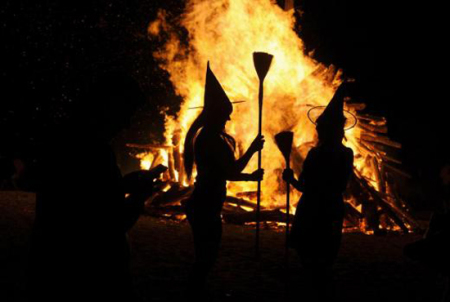Church of Scotland apologizes for its role in torturing Scots accused of being ‘witches’

In its General Assembly last week, the Church of Scotland apologized for its role in the murders of thousands of people, mostly women, who were accused of witchcraft between the 16th, 17th and 18th centuries.
The Church of Scotland’s General Assembly unanimously accepted a motion that was based on a report by its Theological Forum “apologizing for historical wrongs,” the Daily Record reported.
The apology states in part:
Over the past year, the Theological Forum has reflected on what an apology is and when and how one should apologize. These reflections were prompted by a request made to the Church of Scotland in 2021 by an organization called Remembering the Accused Witches of Scotland who are seeking an apology from the Church for its contribution to the prosecution and persecution of those accused of practicing witchcraft in Scotland.
It may be because we think many of the accused simply suffered from mental health conditions that were poorly understood at the time. It may be because we think some of the accused were just ahead of their time, having stumbled upon medicinal properties of plants that were not yet widely known. It may be because we think testimony that has been acquired through torture, the threat of torture, or the offer of reprieve is unreliable. It may be because the power dynamics displayed in the witch trials were so manifestly sexist. Or it may be because we do not think consorting with faeries is a capital offense.
About 4,000 people, mostly women, were accused of witchcraft, then arrested and tortured, and two-thirds of them were executed, The New York Times said earlier, citing historians.
“Apologizing for historic wrongs is not about shouldering the blame now personally for what happened in the past, nor is it about misapplying today's standards to past actors,” the Rev. Susan Hardman Moore, principal of the Church’s New College, was quoted as telling the Faith Impact Forum.
“Rather, apologizing for historic wrongs is about standing in solidarity with the innocents who suffered; acknowledging and regretting the harm that came to them as a result of actions by the Church in the past; setting the record straight by affirming the dignity of the people that our forerunners wrote off; and acknowledging the suffering caused by past norms and policies that we no longer accept,” she continued.
“Importantly, apologizing for historic wrongs can be a step toward reconciling with those who are alienated from the Church now by what the Church has done in the past,” she added.
The Rev. Sue Brown, the convener of the Faith Impact Forum, said the apology means “accepting that we are recognizing that the way we treat our people needs continually to be carefully done,” according to Premier Christian News.
“So that we respect, and treat with dignity, those who share this world with us and we didn’t do that — we failed to do that in the past — and by recognizing that we’re committing to, in the present and in the future, doing our best not to fall into the same trap,” she continued.
“The point of apologizing is not to revisit it, and there’s nobody we can physically apologize to. What we can apologize for, is the way that other people were treated, and we say ‘we’re Christians and yet we didn’t treat people with respect and dignity. We didn’t love them as Christ calls us to love them. That needs to be said clearly in order to ensure, as Christians, that we do as Jesus asks us, which is to love our neighbors.”
On International Women’s Day in March, Nicola Sturgeon, the first minister of Scotland, apologized on behalf of the government.
“It was injustice on a colossal scale,” the Times quoted her as saying.
“At a time when women were not even allowed to speak as witnesses in a courtroom, they were accused and killed because they were poor, different, vulnerable or in many cases just because they were women,” she said.
“As first minister, on behalf of the Scottish government, I am choosing to acknowledge that egregious, historic injustice and extend a formal, posthumous apology to all those accused, convicted, vilified or executed under the Witchcraft Act of 1563.”





















